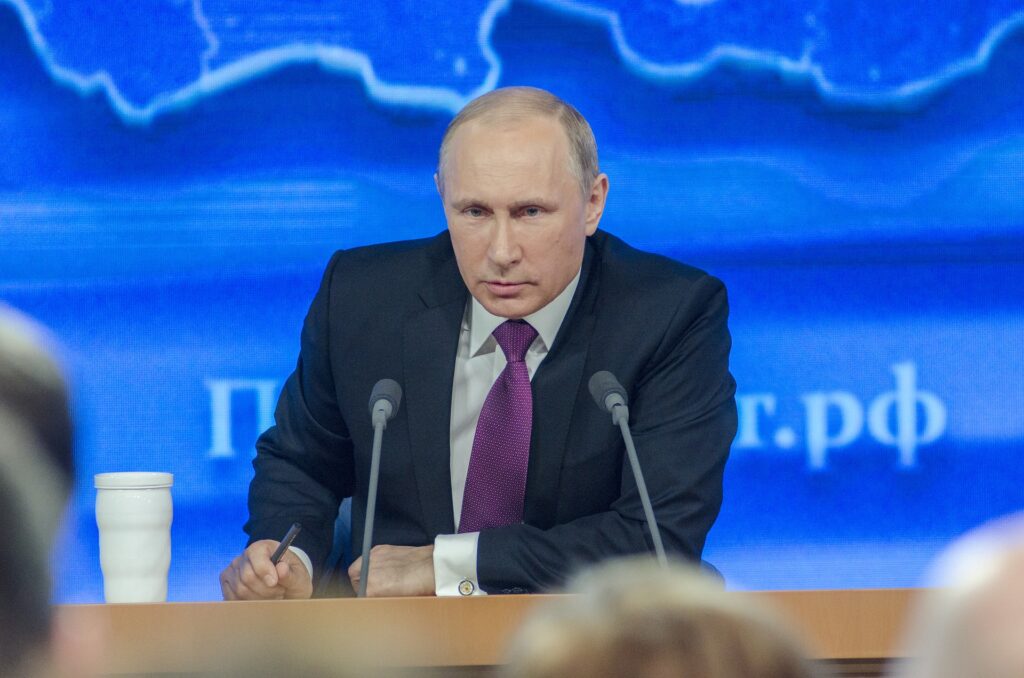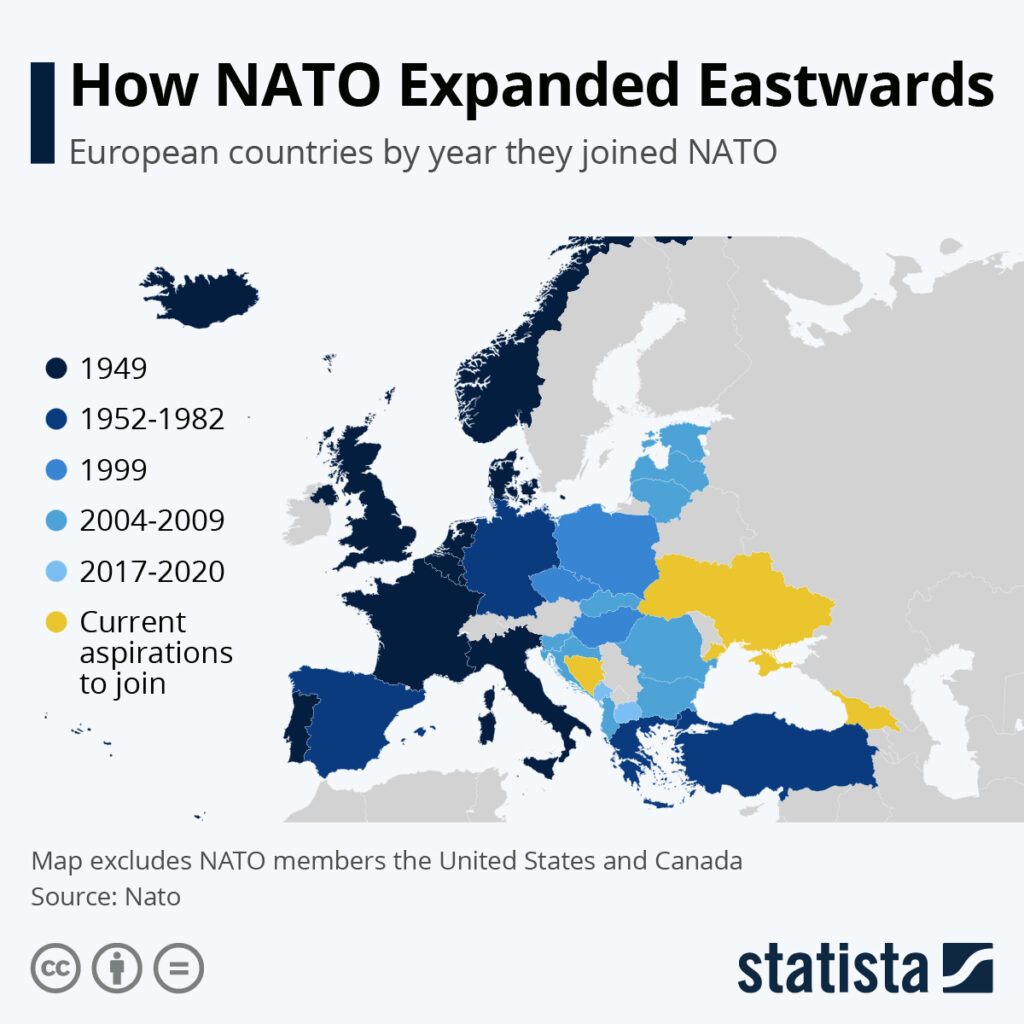By now, the world is well aware of the horror that Russian President Vladimir Putin has unleashed on Ukraine. A peaceful country that has tried to bridge an uneasy distance between east and west now finds itself under attack from a military giant.

In the early hours of 24 February 2022, the Russian President addressed his nation on television. He announced a “special military operation” against Ukraine. It was a brazen declaration of war that was unnecessary, unprovoked and immoral. Most of the international community has roundly and rightly condemned it.
Although I studied international relations and worked in the United Nations system for 17 years, this post is not a historical / geopolticial analysis of the situation. You can easily find that type of analysis elsewhere. Instead, I want to take a closer look at Putin’s speech and his speaking style. It is important to study the oratorical skills of despots to understand how they try to influence people.
One is always at a disadvantage when analyzing the public speaking of someone speaking a foreign language. I do not speak Russian. I only know a handful of words and expressions, and can read the Cyrillic alphabet. (Which came in handy when I traveled to Novosibirsk, Siberia for a speaking engagement.) So I first looked for insights from those who speak Russian.
What native Russian speakers think of Putin’s speaking
There are more than 150 million native speakers of Russian. It is impossible that everyone will have the same opinion of Putin’s speaking. Nevertheless, I did discover a number of interesting observations. There does seem to be consensus that he possesses some good speaking skills.
An article in The Washington Post states that Putin is consistently ranked by Russians as one of the best orators in the country. Indeed, many businessmen and other politicians attempt to emulate his style.
People apparently admire his clear sentences, quick wit and ability to deliver speeches without a script.
“There is clear sentence structure [and] word emphasis and a skillful use of pauses. It’s almost clean speech with a minimal amount of trashy words,” Russian rhetoric coach Dmitry Ustinov told the Moscow Times.
Many Russian speakers consider Putin to be a more capable speaker than his predecessors. According to one native speaker,
He definitely can talk when compared to all the previous Soviet leaders and even Yeltsin, who due to numerous reasons could not make cohesive and intelligible speeches. Brezhnev was delirious, Gorbachev’s poor grammar, extensive use of dialect words and regional accent were funny at first but then became ridiculous, Yeltsin seemed to always be drunk and struggle with the most basic sentences. Putin is way more articulate, he speaks grammatically correct Russian, he is able to convey his messages to the broad audience effectively.
Even those who find his style boring and uninspiring note that he does have skills. One person says,
His speech is rather simplistic, more sophisticated listeners find it nauseating. He is not, in Western sense, an orator – what comes out of his mouth won’t pass for an oration in a good high school. Even those you’d think would be his target audience can find it fake.
…
However he, or his writers, are without equals in producing short, quotable snippets that work like slogans – rude, dirty and convincing. These soundbites find their way to everyone, including people who would never listen to a whole speech.
His delivery is seamless and convincing, those snippets come out as part of him, creating an image of someone who can be rough around the edges yet can be trusted to deliver law, order and social justice. Their well-measured and designed rudeness makes them micro-sensations, and ensures their viral spread.
Another says,
When Putin does speeches, he almost mechanically reads from a piece of paper. It looks and sounds very boring and very Soviet. At least, he sometimes looks at the audience and emphasizes his points with voice and, occasionally, a gesture.
Putin does a lot better when he answers questions. He sounds natural, engaged, informed, sometimes witty. That’s why he does his famous long press conferences.
The 24 February 2022 speech of Vladimir Putin
Putin’s speech – in Russian with English subtitles – is below. A brief analysis follows.
- It is clear that Putin is reading from a text. However, the text is being scrolled directly over the camera lens so that Putin can read and look at the audience at the same time. He thus maintains eye contact.
- Putin speaks slowly and deliberately, with lots of pauses. This adds a sense of gravitas to his words. And, it allows his audience – the citizens of Russia – to follow him more easily.
- He speaks with conviction. Regardless of what he is saying, Putin leaves no doubt that he absolutely believes what he says. This quality is what makes him appear as a strong leader to many.
- Putin has done his preparation. He knows his facts and he knows his history. Putin did not rise through the ranks of the KGB and ultimately to the Presidency of Russia without knowing how to be prepared. He references conflicts in Serbia, Libya, Syria and Iraq (5:00 and 6:30); he cites Article 51 of the UN Charter as justification to “help” the people in the Donbas. Even if he distorts history with half-truths, the omission of facts and, in some cases, outright lies, Putin knows how to create a historical “truth” that many find credible.
- At 0:48, Putin appeals to the emotions of his listeners. He raises the spectre of NATO deceiving Russia about its true intent while, all the while, moving closer to Russia’s borders. This is a theme to which he returns time and agin in the speech.
I am referring to the eastward expansion of the NATO, which is moving its military infrastructure closer to the Russian border. It is a fact that for 30 years we have been patiently trying to come to an agreement with the leading NATO countries regarding the principles of equal and inviolable security in Europe. In response to our proposals, we invariably faced either cynical deception and lies, or attempts at pressure and blackmail, while NATO continued to expand despite our protests and concerns. Its military machine is moving and, as I said, it is approaching our very border.
- To be fair – without in any way justifying the invasion of Ukraine – Putin is correct about the expansion of NATO. Since the fall of the Soviet Union, NATO has moved steadily eastward. It now comes up against Russia’s borders in the north. This map from Statista on 25 January 2022 shows how NATO has expanded in Europe since 1949. Ukraine expressed interest in joining NATO as far back as 2008. This expansion is a worry for many Russians.

- Putin uses rhetorical devices. One device that I have seen him use before – and with great effect – is hypophora: asking a question and immediately answering it. We see this around 1:40 of the speech.
Why is this happening?
Where did this insolent manner of talking down from the height of their exceptionalism, infallibility and all-permissiveness come from?
What is the explanation for this contemptuous and disdainful attitude to our interests and absolutely legitimate demands?
The answer is simple. [Putin then goes on to discuss the breakup of the Soviet Union in 1980 and how that weakness led to Russia being taken advantage of by the West.]
- Another example of an effective use of rhetorical devices occurs around 9:30. After talking about the disintegration of the Soviet Union and the willingness of Russia to be open to the West, Putin says “… they immediately tried to put the final squeeze on us, finish us off, and utterly destroy us.” This statement is a combination of two rhetorical devices: tricolon (a series of the three words or phrases); and commoratio (repetition of the same idea using different words).
Lies, propaganda and threats
- Starting around 11:20, Putin draws a parallel between NATO’s expansion to the east and the Nazi invasion of the Soviet Union on 22 June 1941. In so doing, he taps into something that is deeply ingrained in the psyche of many Russians. No country suffered more losses in World War II than the Soviet Union. Monuments to the Great Patriotic War can be found throughout the country. Almost 80 years since the end of the war, its impact lingers. That is why, at 12:40, Putin is adamant: “We will not make this mistake a second time.”
- Putin does not shy away from using extreme language to tap into the emotions of his listeners. “… our ability to counter this brash and never-ending blackmail.” (13:10) “For our country it is a matter of life and death …” (15:40). This is in keeping with the comment above about quotable slogans that are “rude, dirty and convincing”.
- At different points in the speech, Putin talks about his desire to “de-Nazify” Ukraine (17:25, 17:50 and 20:35). It is an example of how Putin takes a small truth and twists it into something grotesque and untrue. As explained by journalist and Russian specialist Julia Ioffe in an interview with Stephen Colbert, when Ukrainians ousted a pro-Kremlin President in 2014, “… there was a very active right-wing nationalist, sometimes neo-Nazi, contingent, but it was a minority on the Maidan. And Russian propaganda took that — they often just take like a little bit of truth and spin it into this, you know, cotton candy of lies. … I think there are a lot of Russians, especially those who watch state TV, who think [Ukraine] is a country run by Nazis, even though it has a Jewish president, many of whose relatives were killed in the Holocaust by Nazis.”
- Towards the end of the speech, Vladmiri Putin is ranting, descending into outright propaganda. He refers to the democratically elected government of Ukraine as “… the junta, the people’s adversary which is plundering Ukraine and humiliating the Ukrainian people.” (24:00)
- At 24.40, Putin makes an unspecific, but ominous threat to the West. He says that Russia will respond immediately to any interference and that “… the consequences will be such as you have never seen in your entire history.”
- As the speech winds down, Putin attempts to come full circle by portraying Russia as being in the right. “We all know that having justice and truth on our side is what makes us truly strong. … our strength and our readiness to fight are the bedrock of our independence and sovereignty.” (26:20)
- A final thought on Putin’s speech. At 15:13, I believe that he tips his hand on his true intentions. He refers to the territories adjacent to Russia as “our historical land”. If you know the history of the area, you know that this means more than Ukraine. It includes Estonia, Latvia, Lithuania, Moldova and more. Although NATO’s expansion concerns Putin, I believe that his dream of restoring the territorial integrity of the former Soviet Union is at least as important for him.
As I publish this post, the fate of Ukraine is still unknown. Things look grim, but the courage of the Ukrainian people is inspiring. And protests denouncing the invasion have erupted around the world, including across Russia. Let us all hope that the conflict ends soon and that Putin’s attempt to take over Ukraine fails.
In my next post, I will look at one of the speeches from Ukrainian President Volodymyr Zelenskyy.
















5 Replies to “Analysis of a Speech by Vladimir Putin”
Great and timely analysis John.
I especially agree with your last sentence.
Thanks, Andy.
Thank you very much, John!
I enjoy and learn a lot from your stupendous analysis of speeches!.
Muchas gracias, Alba!
Comments are closed.